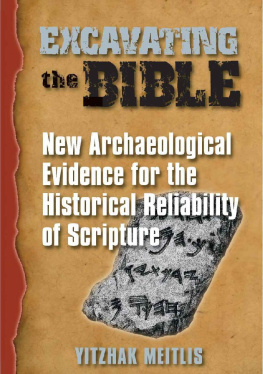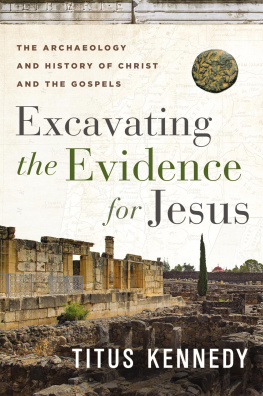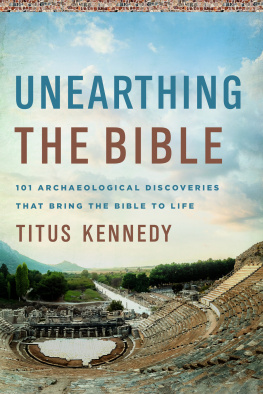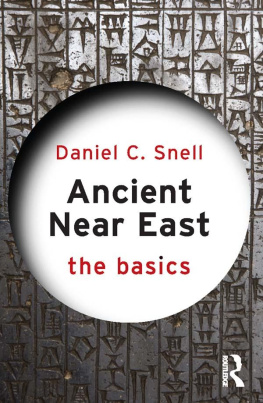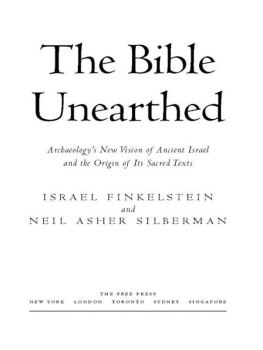Table of Contents
Copyright 2012 by the David Dov Foundation
All rights reserved. No part of this book may be used or reproduced in any form whatsoever without written permission, except in the case of brief quotations embodied in critical reviews and articles
Manufactured in the United States of America
Published by:
Eshel Books
8600 Foundry Street
Mill Box 2043
Savage, Maryland 20763
800-953-9929
www.EshelBooks.com
In Cooperation with:
David Dov Foundation
603 Twin Oaks Drive
Lakewood, New Jersey 08701
www.DavidDov.org
Library of Congress Cataloging-in-Publication Data
Meitlis, Yitzhak.
Excavating the Bible : new archaeological evidence for the historical reliability of Scripture / Yitzhak Meitlis.
p. cm.
Includes bibliographical references (p. ) and index.
ISBN 978-0-935437-41-6
1. Bible--Antiquities. 2. Palestine--Antiquities. 3. Excavations (Archaeology)--Palestine. 4. Bible--Evidences, authority, etc. I. Title.
BS621.M45 2012
221.93--dc23
2012000258
In memory of my father, Abraham (Adam) Meitlis, who planted within me a love of the Bible and of the Land.
The David Dov Foundation wishes to thank
the following individuals for their assistance:
Dr. Irving and Cherna Moskowitz
Dr. Bernard Lander zl
Leonard A. Wein, Jr.
Lee C. and Anne Samson
Foreword
It is with the greatest of hope that we bring this long anticipated study of Biblical Archaeology by Professor Yizhak Meitlis to the minds of religious leaders, interested readers and open-minded archaeologists.
It is of great significance that those of us who believe in the reliability and sanctity of Scripture finally view the many findings of Biblical archaeologists, which demonstrate that much of what has been unearthed under Israels soil, is also found in the Biblical text.
The world may be divided into those who believe that God is the Author of the Bible and Creator of the world, those who think otherwise and those who are just not sure.
For those for whom the Bible is a matter of faith, no convincing is necessary and for people who reject its truth, perhaps no convincing is possible. Excavating the Bible is meant to encourage readers to discover that many of the events described in the Bible not only happened, but that they can be scientifically corroborated, an indication that the entire scriptural text is accurate as well. This is a simple thought with profound consequences.
Many people who are unsure will find assurance. Some will feel more comfortable in their beliefs. Others will just enjoy the excellent scholarship. It has been said that our role as human beings is to help perfect the world. By demonstrating the reliability of the Biblical narrative, perhaps we can cast new light on the foundation of much of civilization.
Along with Rabbi Pinchas Stolper, President of the David Dov Foundation, I am optimistic that Excavating the Bible will mark a turning point in Biblical Archaeology,. We hope it will encourage more people to find their heritage in the excavations taking place in Israel and recognize their origins in the Bible itself.
Leonard A. Wien, Jr.
Vice President
David Dov Foundation
Acknowledgments
I wish to thank the following who were of significant assistance in bringing this book about: Mr. Shlomo Musaiif, a lover of Israel and archaeology. Professor Israel Rosenson and Dr. Gabi Barkai who read the manuscript and made brilliant suggestions. Dr. Orli Albak who was helpful with vocabulary. Rabbi Pinchas Stolper was supportive in every possible way. Finally, I wish to thank the Israeli Department of Education for awarding me the 2005 Prize for Innovation in Israel Studies.
Why This Book Had to Be Written
Defusing the Tension between the Bible and Archaeology
Until the 1970s, Biblical archaeologists viewed the historical sections of the Bible as reflecting some degree of historical authenticity, even though not everyone accepted all of the details at face value. No serious arguments raged over the existence of the Patriarchs; no stormy sessions were held over the reliability of the Exodus account. Though some scholars looked for natural reasons to explain the plagues in Egypt and the splitting of the Re(e)d Sea, it was clear that the Israelites entered the land of Israel from the Sinai Desert.
The major argument of the 1960s was over the path the Israelites followed in the desert and the way they entered the Holy Land. Did the Israelites mount a comprehensive military operation when they entered the land, as described in the Book of Joshua, or was the Israelite entry slower and more gradual? In contrast, there was no argument at all about the era of David and Solomon.
Yet winds of Bible-criticism blowing from various European universities began to fascinate and influence Israeli scholars. During the 70s, and the early 80s, the first generation of archaeological researchers in Israel passed away. They were replaced by a new generation of scholars, some of whom tried to cut a new path. The new approach led to an impasse. During the past few decades, tension between the new archaeology and the Bible has grown more palpable.
The scholars of the new school dismiss the authenticity of most of the Bible out-of-hand. In their view, the books of the Pentateuch, Joshua, Judges, Samuel, and parts of Kings are nothing more than folklore, without any historical basis. The new rules of the game are: (1) the more ancient the period, the less the Bible reflects historical truth, and (2) some degree of historical truth could be ascribed only to events confirmed by external sources, i.e., Assyrian, Babylonian or Egyptian documents.
Our challenge in this volume will be to put the approach adopted by these later scholars to the test. Is there a contradiction between archaeological findings and the Biblical text? The question has become a wedge between Bible scholars and archaeologists. Though it intrigues many Bible scholars, they tend to ignore archaeology altogether, due largely to the dogmatic attitude of todays archaeologists. At the same time, many archaeologists refrain from referencing verses in the Bible when evaluating archaeological finds, even when to do so seems obvious and logical.
The gap has been steadily widening. The group known as the Bible deniers is to all intents and purposes cutting the ground away from under their own feet, for most general interest in Biblical archaeology is generated by peoples desire to understand the Bible. It is the Bible that links Judaism and Christianity with the archaeological sites of the Holy Land. Biblical archaeology without the Bible becomes a dry study of yet another branch of human culture that interests only the very few.
Need this gap exist? This work examines, using archaeological instruments, whether there is indeed a clash between archaeology and the Bible. Having earned a doctorate in archaeology from Tel Aviv University, with many years of service as a teacher of geography and Bible studies, this writer believes that no substantive contradiction exists between the two fields.
No significant discovery has been made that indicates any contradiction . On the contrary, recent studies have confirmed the links between the Bible and the material findings of the last few years. The present crisis stems from a passing fad which has given rise to a mistaken interpretation of archaeological findings. I am sorry to report that these interpretations are often based on a lack of objectivity on the part of the researcher who, on occasion, is even tempted to distort archaeological data in order to strengthen his own weak arguments.
This book will center on the history of the Judean Hillsthe epicenter of the Jewish people for many generations, from the Period of the Patriarchs until the destruction of Solomons Temple.

